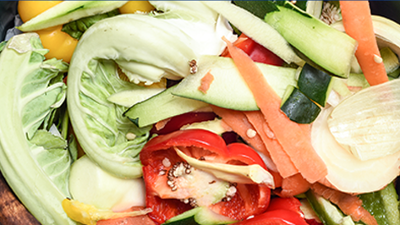Reducing your food waste is not only good for the environment, but it can also save money

Good for the environment
Reducing your food waste is one of the easiest ways to tackle climate change. Landfilling just 1kg of food has the same carbon impact of 25,000 plastic bottles degrading in landfill!
When food waste is sent to landfill, it will breakdown and release methane, a greenhouse gas and contributor to climate change. Using your brown bin, or composting at home, are the best ways to dispose of any food waste you cannot avoid. Food recycled in brown bins is composted locally in Glenfarg. Local farmers will spread the compost on their fields to help add nutrients back into the soil to promote healthy crop growth.
Good for your pocket
Throwing away food that could have been eaten costs the average Scottish household around £460 every year! Taking simple steps such as meal planning, using shopping lists or taking a fridge or store cupboard "shelfie" before you go shopping can all cut down on buying things we don't need.
Why not explore shopping using Food Redistribution Options (PDF, 294 KB) too - it saves money and is good for the environment.
For inspiration on where to start on your food waste reduction journey, visit Love Food, Hate Waste Scotland
Food waste reduction in Perth and Kinross
The average household in Perth and Kinross fills one third of their general waste bin with food waste - and most of that food is still edible and in it's packaging!
The Waste Team have worked in partnership with many organisations in recent years to run events and create resources to address the issue of food waste. A selection of videos and recipes to provide you with inspiration can be found below:
- Watch how to make Lentil Soup
- Watch how to make a Smoothie (To-Feel-A)
- Watch how to make a Smoothie (The Hulk)
- Watch how to make a Smoothie (Summer Sunshine)
- Watch how to make a Smoothie (Jason Vales Berry Banana Crunch)
- Watch how to make a Smoothie (Gym Juice)
- Browse the Waste Less, Save More Online Recipe Book (PDF, 2 MB), which shares local householders' favourite recipes which creatively use up leftovers and are inspired by regional ingredients. Local businesses and organisations have also contributed their favourite recipe.
The Waste Services Team and the NHS's Community Cook It joined forces for One Pot Cooking Workshops in 2022. These are the recipes from the Workshops:
- Carrot & Butterbean Soup (PDF, 261 KB) - Tip: Carrots can be replaced or accompanied by a tin of tomatoes
- Chilli Con Carne (PDF, 182 KB) - Tip: Leave out the Chilli and it is a spaghetti bolognese mix
- One Pot Curry (PDF, 219 KB) - Tip: Use any squash instead of the meat
Unavoidable food waste - such as vegetable peelings, fruit cores, used tea bags and used coffee grounds - can be recycled (without a garden waste permit) in the kerbside brown bin or composted at home so that it doesn't go to landfill.




